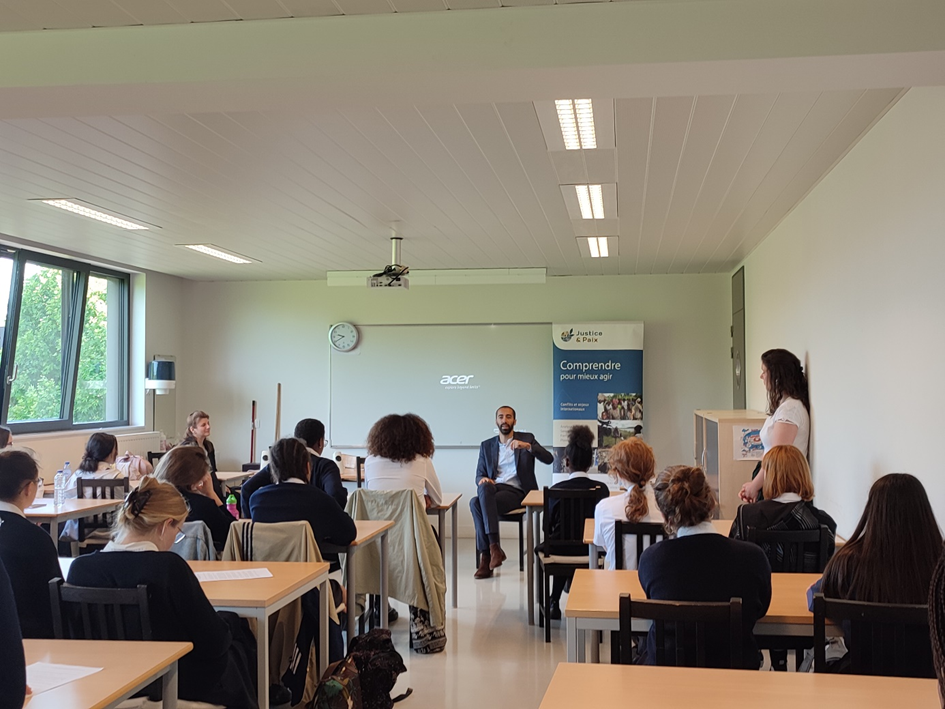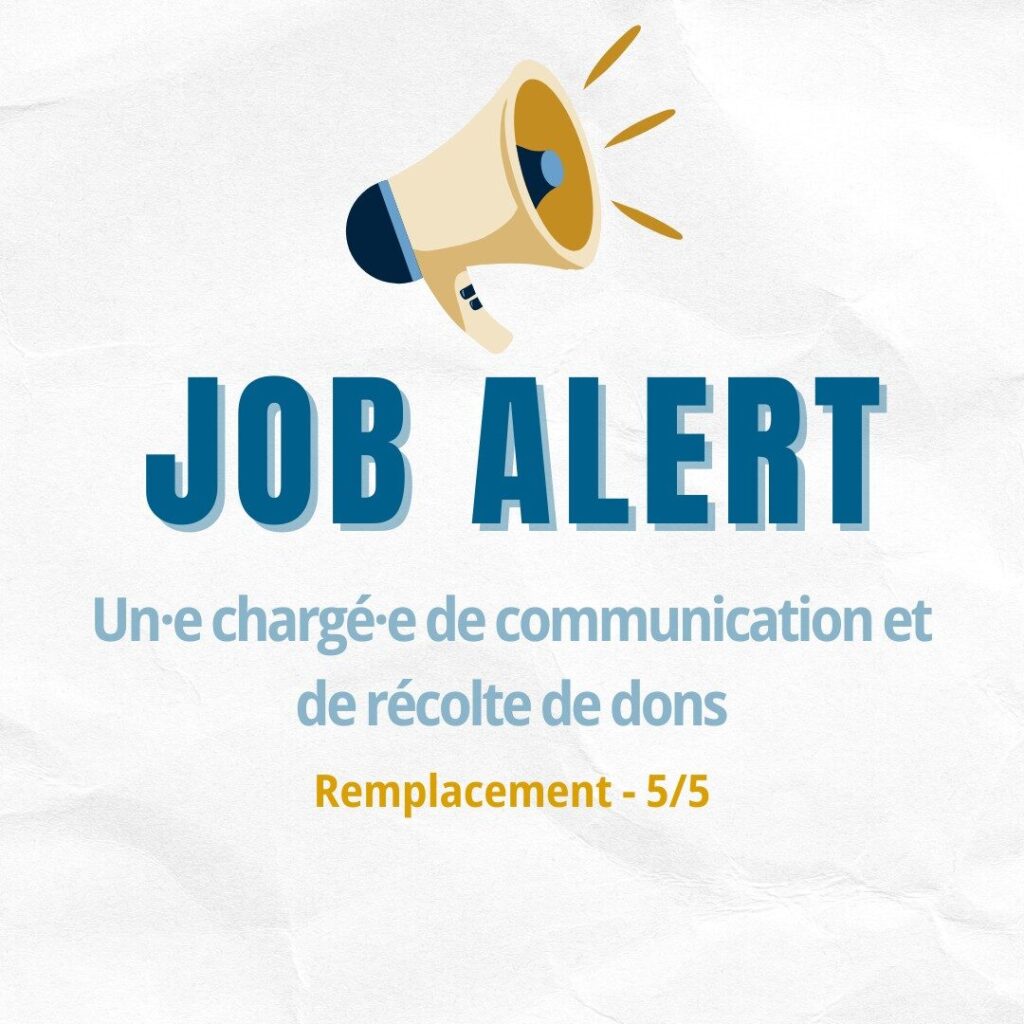Between January and May 2022, 25 young volunteers participated in the “Young people and migration: from observation to action” project, a project to question, analyze, understand and finally position themselves as engaged citizens. in the society.

Between January and May 2022, 25 young volunteers participated in the project “Young people and migration: from observation to action
Migrations, migrants, migratory flows… These words regularly make the headlines in the French-speaking Belgian media. The subject remains a concern for many citizens, whether they are more “for” or “against”. Migration realities are complex, and the discourse about migrants is sometimes disarming. Migrants are often presented as enemies or invaders who should be wary of; moreover, the global context of scarcity of resources, worsening disasters due to climate change and general withdrawal into one's community fuels feelings of fear of the Other or of powerlessness. This latter feeling being particularly present among young people, it is all the more important to equip them to fight against prejudices, misunderstandings and simplistic discourse. A project was thus born, in collaboration with Caritas International And Magma, to take the path of “ see-judge-act » with around 25 young people on the issue of migration. Concretely, this project was to allow them to question, analyze, understand and finally position themselves as citizens engaged in society.
The project was carried out at the Institute of the Faithful Virgin (Schaerbeek) between January and May 2022. The young people were volunteers from third, fourth and fifth secondary schools. By our side, they[i] embarked on a journey of reflection, discovery and action on migratory realities. In the program :
- discovery of the journey of a young migrant with the immersive tool “ Walk in my shoes » ;
- theoretical workshop on international law and the reception situation in Belgium and Europe;
- meeting with Unaccompanied Foreign Minors (MENA) in a Caritas center;
- emergence of political proposals;
- filming of videos incorporating these political proposals;
- meeting with the Secretary of State for Asylum and Migration, Sammy Mahdi[ii].
“Putting yourself in the shoes” of a young migrant
During the stage of discovery, understanding and the beginning of the analysis, the young people were able to “put themselves in the shoes” of a young Eritrean girl thanks to the “Walk in my shoes” tool and attend a theoretical workshop on asylum, migration and integration policies in Belgium, as well as meeting young MENA[iii]. Very often, the discovery of these situations is a shock for these young people. They open their eyes to very complex situations, they who have never had to experience dilemmas where safety and life are sometimes at stake. The empathy of young people is strongly solicited, but a first analysis also emerges:
- Young people understand that migrants are faced with important issues, and that their journeys are more often the result of no choice (eg I cannot return home because I am expected there to put me in prison) than of choice. positive. Furthermore, the journey, once started, is often extremely risky;
- A second point of analysis concerns the media treatment of migration. Young people realize (or remember) that the media do not always carry out rigorous analyses, that their comments are sometimes based on emotions such as pity or fear of the Other. On the other hand, the capacities for action and resilience of migrants are not often covered by the media.
- A third point of analysis concerns the inconsistency between texts which establish rights for migrants and obligations for states (Universal Declaration of Human Rights, Geneva Convention) and the migration and reception journeys experienced by migrants. migrant people: dangerous migratory wheels, controls and pushbacks at borders, overcrowding of reception centers, long time to obtain refugee status, etc.
- A final point concerns the fact that the difficulties of migrants do not stop after crossing the Belgian border or after receiving notification of their refugee status: they still experience discrimination in employment or in search for housing, the difficulty of obtaining support (eg from the CPAS when social workers are overwhelmed), of feeling truly integrated, of managing the traumas that they may have accumulated during of their journey, etc.
Meet and bring out
Following the meeting of the MENA and the start of the war in Ukraine[iv], migration is no longer only at the heart of the project, but also current affairs. The young people were able to refine their analysis on themes which are less visible at first glance, but just as important, such as the question of transmigrants or the criminalization of solidarity. The situation in Ukraine, with many migrants arriving in Europe in a very short time, also pushes young people to ask questions. The situation seems asymmetrical to many of them: why was a special protection status created for Ukrainian refugees? Why are the procedures simplified for them, and not others? Why are the media reporting calls for solidarity so loudly in this case, and not for the many other people who must flee their country?
At this stage of the project, and undoubtedly influenced by the Ukrainian situation, the judgment of young people is often final regarding Belgian and European migration policies: “selfish”, “hypocritical”, “poorly organized”, “unjust”… are words that arise in their speech. They, on the other hand, want a fair, logical, organized, humane, secure policy... With the help of facilitators, young people identify what does not suit them, pose problems and formulate questions as well as political proposals on these subjects. Here are some examples of questions or suggestions that can be heard:
- Why not build more centers with more reception places in Belgium?
- Why not extend the temporary protection, adopted for Ukrainians, to all people fleeing the war?
- Why not change the Dublin Regulation[v], in order to establish an equal distribution [of reception of migrants] between all European countries?
- Why not collaborate with the media to show more examples of successful migration cases? [in relation to the Office of the Secretary for Asylum and Migration]
Challenge in person and on the internet
To take action and carry out “citizen advocacy”, the political proposals were presented in the form of short videos and distributed on the internet (social networks). A meeting with the Secretary of State for Asylum and Migration, Sammy Mahdi (CD&V), is organized at the end of May in the premises of the Virgin Faithful. Young people are present in large numbers to challenge the Secretary of State and debate with him. Several times, the young people engage in a real debate with the secretary of state, in particular on the question of subsidiary protection granted to Ukrainians; or even on the strengthening of borders and agreements with third countries. We can guess that what really motivates them are questions of human rights: protection, equal treatment, access to studies and work, etc. These questions are debated, the secretary of state supports certain positions which are not unanimous, for example the normality of a “philosophy of the neighboring country” in a crisis situation (which would justify the different status proposed to the Ukrainians nes); or the fundamental difference between a person who flees because they are in danger and a person who leaves their country because they are faced with a “not ideal situation” (poverty, etc.) Some students defend their point of view , others agree with the secretary of state that we cannot agree on everything in a democracy.
The hour passes too quickly, many questions remain unanswered, but they will be sent to the Secretary of State's office for additional answers. Notes were also taken during the exchange and sent to the Secretary of State as a policy deliverable. The young people are very satisfied with the meeting with the Secretary of State. They underline the interest of having received his answers, both from a local political leader (CD&V), but also from a “person on the ground”. They also underline the interest of this meeting in forming a critical opinion on Belgian realities and the dilemmas inherent in the political world.
The strength of commitment
This six-month project made it possible to strengthen the critical thinking of young people, to make them see behind the scenes by offering them the opportunity to meet both UMs and the Secretary of State for Asylum and Migration, but also to put them into action. In our opinion, it is essential not to leave young people feeling helpless in relation to the complexity of a society where they will be increasingly connected, not only through social networks, but also via constantly changing migratory flows. Throughout this journey, the young people who got involved showed a keen analysis and great empathy, but also a powerful desire to get involved to make things happen. One more example which shows that the dynamics of continuing education and education for global and united citizenship (ECMS) are essential in 2022.
Claire Mathot.
Project carried out with the support of the Brussels-Capital region via Brussels International.
[i] In this analysis, the pronoun “they” will be used to designate the group of young volunteers, because out of 27 students who took part in this project, 26 were girls.
[ii] As the migration issue covers multiple aspects, we have decided to mainly address the situation of refugees. The 1951 Geneva Convention relating to the Status of Refugees is the key document in the definition of “refugee”. This is a person who has no choice but to leave their country or region because their life or freedom is threatened because of: their ethnic origin; of his nationality; of his religion; of his belonging to a certain social group; of his political opinions. Concretely, this is a person who cannot be protected in their own country.
[iii] In our opinion, this encounter is halfway between “seeing” and “judging”.
[iv] The conflict began on February 24, 2022.
[v] Which establishes that a person arriving on European soil must submit their asylum application in the same country; in practice, the “border” countries of Europe are therefore very concerned (Greece, Italy, Eastern countries, etc.).



